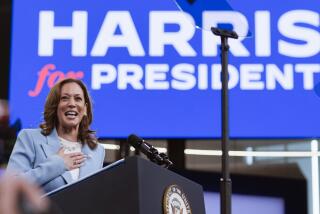Clinton loyalists fail in bid to end caucuses
PITTSBURGH — Hillary Rodham Clinton loyalists tried Saturday to kill off the caucus system that proved so damaging to her presidential bid, but were beaten back by a Democratic Party leadership firmly under the command of her former rival, Barack Obama.
Democrats who supported the New York senator’s candidacy pushed to amend the new party platform so that caucuses would be banned in future presidential contests.
But the party’s platform committee refused to allow a vote on the amendment or even a discussion. Co-chair Patricia Madrid, a former New Mexico attorney general, said the matter would instead be taken up at a later date by the party’s rules committee.
That left Clinton supporters disappointed. They say that if the party were serious about enfranchising more voters, it would take a clear position against a system that makes participation difficult for shift workers, the disabled and overseas members of the military. In traditional primaries, people have all day to vote. But a caucus may last just a few hours.
During the Democratic race, Obama outmaneuvered Clinton in Iowa and many other states that held caucuses, turning out far more supporters and racking up enough delegates to give him an insurmountable lead.
“My feeling is the issue should have been aired and people should have had the opportunity to speak and vote it up or down,” Bob Remer, a delegate for Clinton from Chicago, said in an interview Saturday. Remer, who is a member of the platform committee, had put forward the amendment that was shelved. “The caucus system is the exact opposite of everything I’ve been fighting for in terms of maximizing democratic input.”
The 186-member committee voted to recommend adoption of a new Democratic platform, the party’s formal statement of policies and principles. Final approval will come at the party’s national convention Aug. 25-28 in Denver.
Clinton supporters were hoping to influence the draft in ways that reflect her interests. For its own sake, the Obama campaign would like to accommodate Clinton forces where it can; with Republican John McCain keeping the general election contest close, according to recent polls, Obama needs to unify voters behind him.
So the platform is a mixed bag. In a section devoted to expanding opportunities for women, the document says that Democrats are proud “that we have put 18 million cracks in the highest glass ceiling,” a respectful reference to Clinton’s vote total in the primary and a phrase she used in her concession speech.
But Obama, now in control of the Democratic Party machinery, clearly enjoys the greatest influence over the document. The platform reflects many of his policy goals and borrows language from his stump speech. “Our planet is in peril,” reads the preamble.
One of the defining policy differences the Illinois senator had with Clinton involved healthcare. She wanted a requirement that people carry health insurance; he did not.
The platform has no mention of a health insurance mandate. But it does include language that acknowledges “there are different approaches within the Democratic Party about how best to achieve the commitment of universal coverage.”
Platform committee leaders insisted that Clinton was given a role in shaping the document. At some point, party officials said, the future of the caucus system will be decided, but inserting a paragraph in the platform is not the best way to settle the matter.
Madrid, the committee co-chair who set aside the caucus amendment, said the platform “wasn’t effectively controlled by Obama, although his people certainly had a hand in it. He’s the candidate and he will have to run on this platform. That’s not unreasonable. The issue of the caucuses won’t be resolved here at the platform. It will be resolved on the DNC level, and they will have their full day in court, I guarantee you.”
Tensions between Obama and Clinton forces were evident at the Convention Center here, where the meeting took place. Clinton’s supporters sat together in the audience, wearing campaign buttons and T-shirts bearing her name. One person hissed when Obama’s name was mentioned.
Among the activists serving on the committee, there were also signs of a split.
Lynn Forester de Rothschild, the head of a private holding company and a member of the committee, took the microphone after the caucus amendment was defeated to register a protest.
After the meeting, she said she still hadn’t made up her mind about whether to vote for Obama because she didn’t “understand how a person comes to the U.S. Senate and -- before they’ve done one thing there -- decides they can be president.”
“I have serious questions about Barack Obama and what the Democratic Party is doing,” she said. “I have serious issues with Barack Obama.”
--
More to Read
Get the L.A. Times Politics newsletter
Deeply reported insights into legislation, politics and policy from Sacramento, Washington and beyond. In your inbox three times per week.
You may occasionally receive promotional content from the Los Angeles Times.










